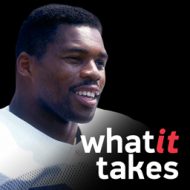I can get so high off my belief and my will that it’s almost like you are invincible. I’m so high off God that I don’t care what you do, you can never destroy me.
Herschel Walker was born in Augusta, Georgia and grew up outside of Wrightsville, Georgia. For the first 11 years of his life, Herschel Walker showed little interest in sports; he preferred reading books and writing poetry. At age 12, however, he began a crash exercise program. Over the next year, he did 100,000 push-ups, 100,000 sit-ups and sprinted thousands of miles.
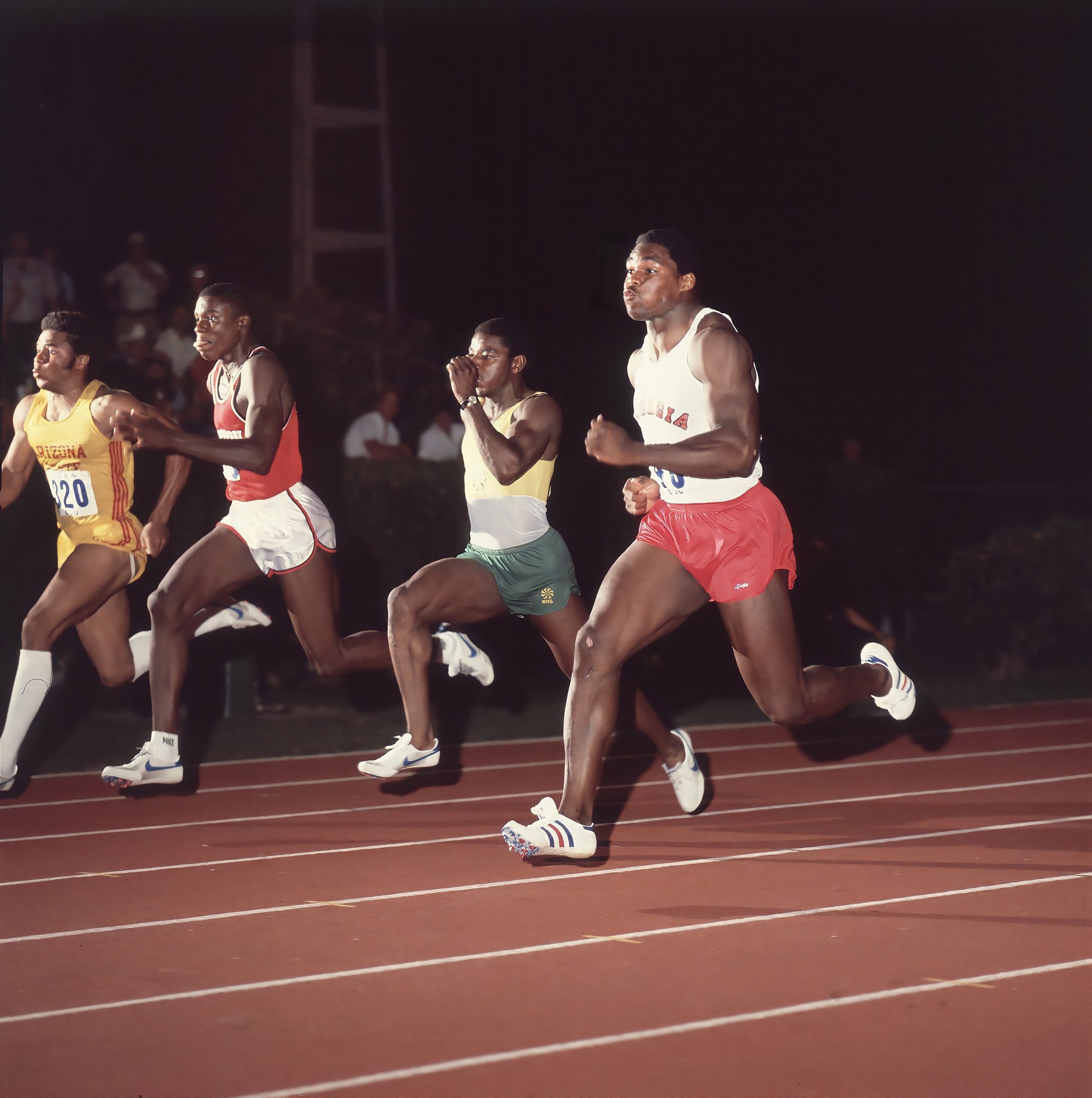
In high school, Walker played football and basketball and competed in track and field. He scored a record-breaking 86 touchdowns as a running back and led his teams to state championships in both football and track while maintaining an A average.
Herschel Walker participated in the 1980 Academy of Achievement program as the valedictorian of his class and the most sought-after high school football player in the nation.
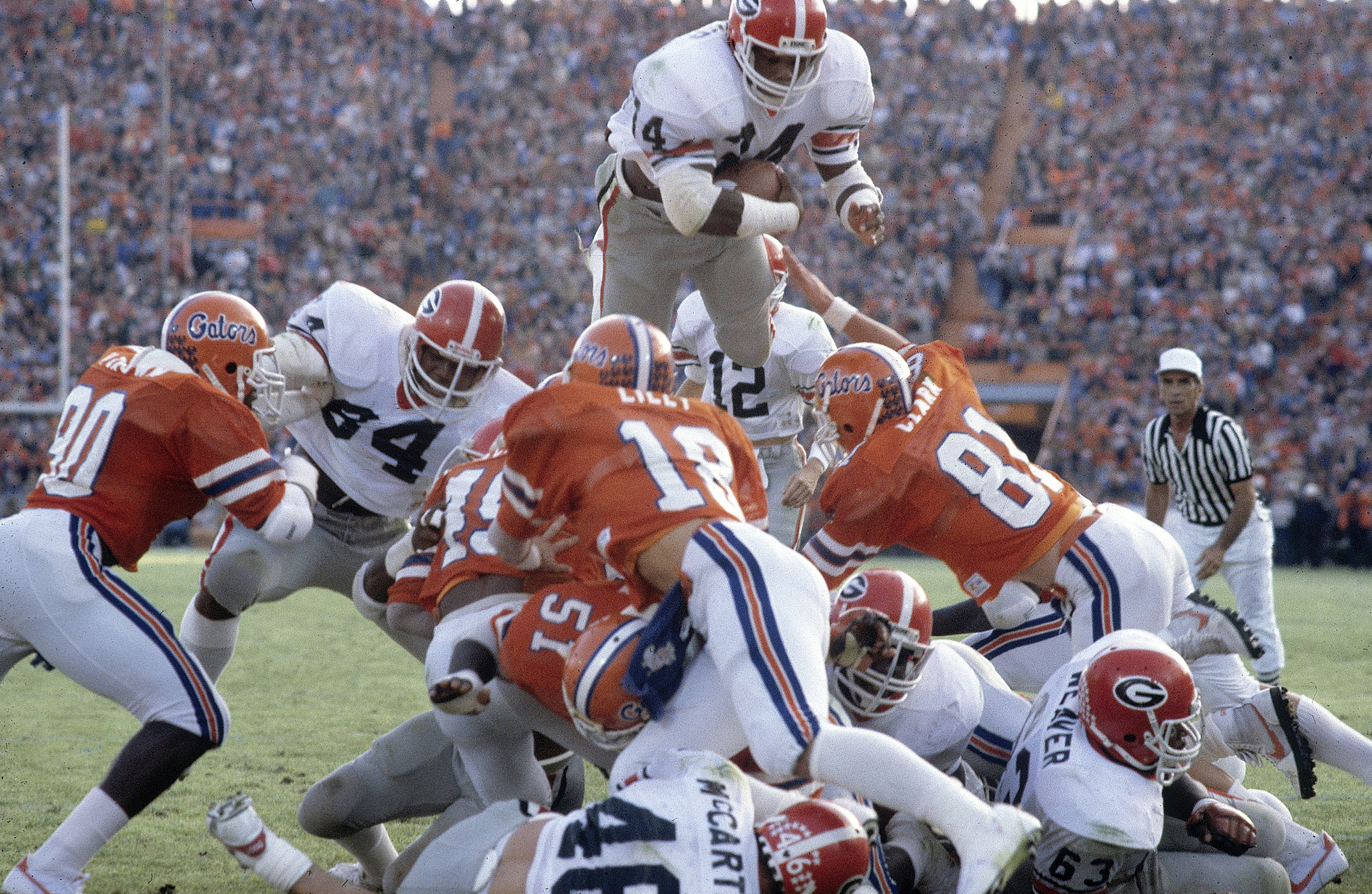
As a freshman at the University of Georgia, Herschel Walker ran for 1,616 yards, scoring 15 touchdowns, and setting an NCAA freshman rushing record. He led the Bulldogs to victory in 12 out of 12 games, including the national collegiate championship. Walker earned consensus All-American honors three consecutive years, set 10 NCAA records, 15 Southeastern Conference records, 30 Georgia all-time records, and capped a sensational college career by earning the coveted Heisman Trophy in his junior year.
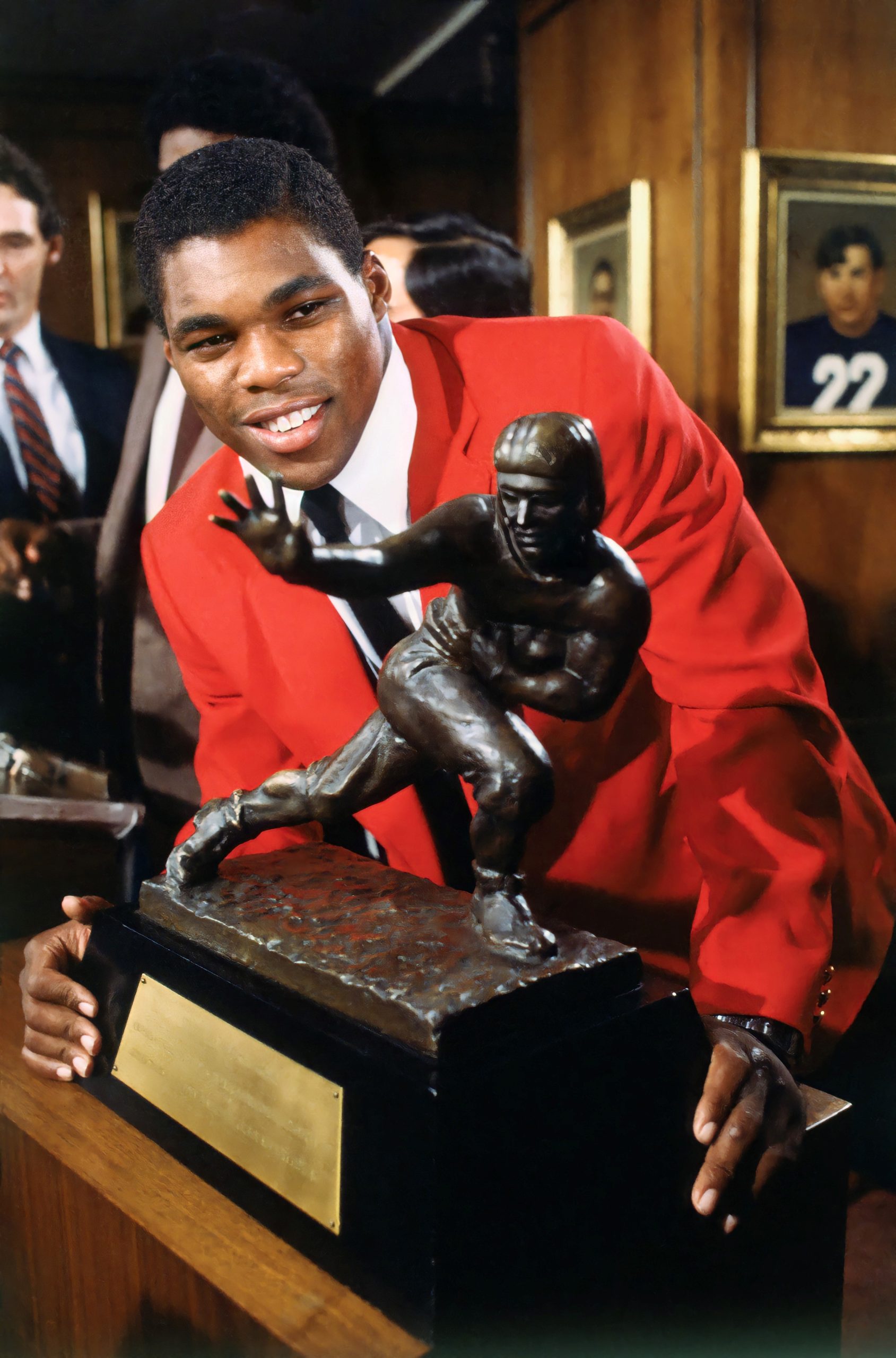
In 1983, Walker gave up his final year of collegiate eligibility and turned professional, joining the New Jersey Generals of the short-lived United States Football League. Walker dominated the league, earning Most Valuable Player honors and setting the single-season pro football rushing record (2,411 yards).
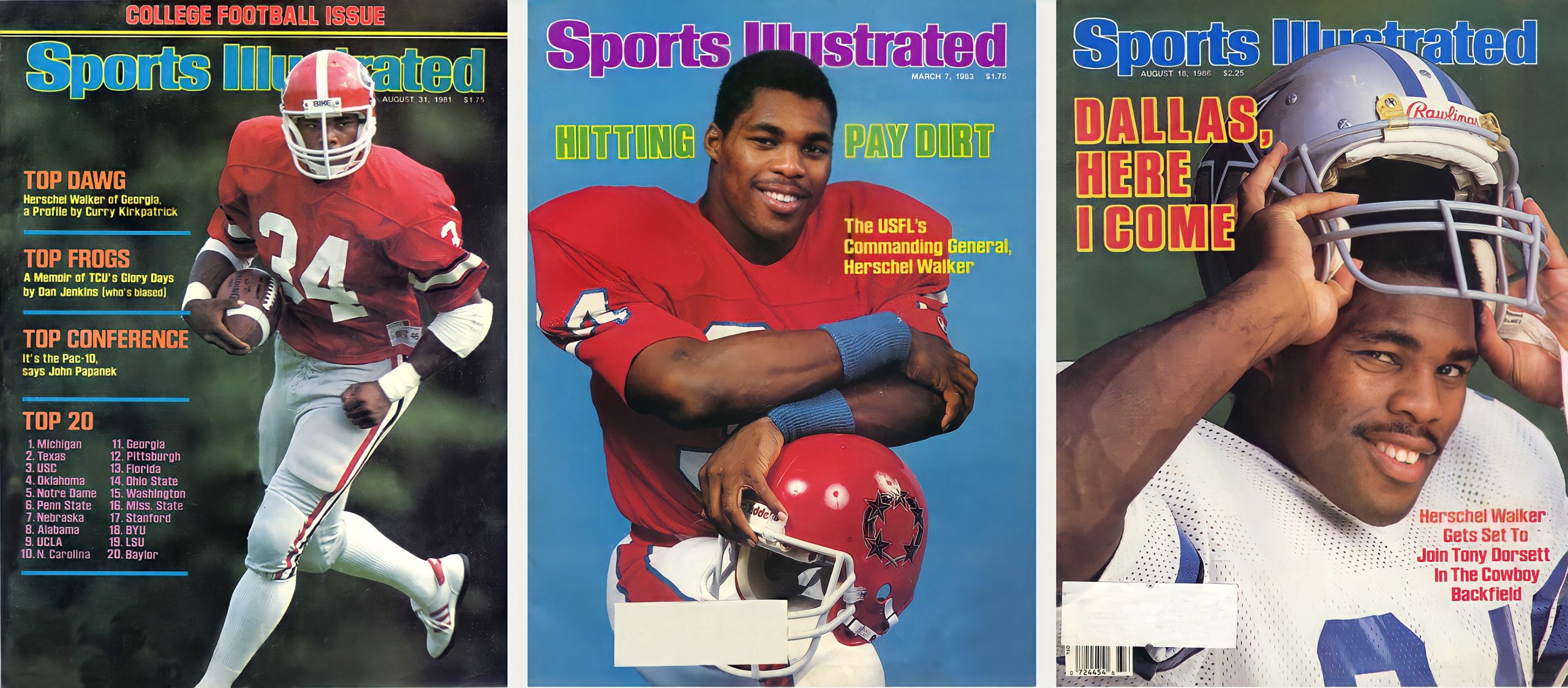
Walker joined the Dallas Cowboys in 1986, where he led the entire NFL in rushing and earned All-Pro honors. Walker moved to the Minnesota Vikings as starting running back in 1989. In 1992, he joined the Philadelphia Eagles football team but returned to the Dallas Cowboys in 1996. He retired from the NFL in 1997.
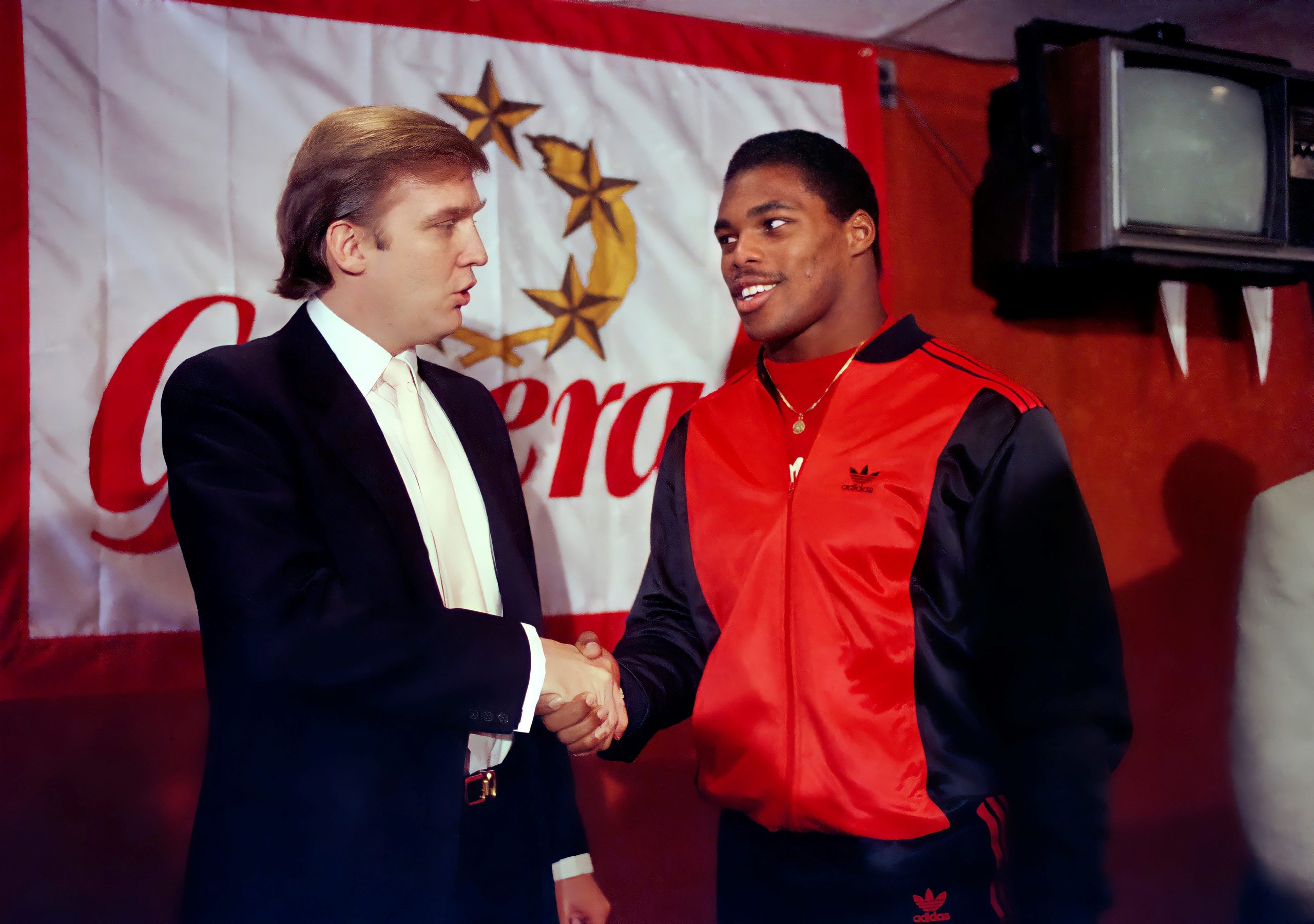
Walker was one of the top running backs in the pros. He finished his professional career with a total of 8,225 yards and 61 rushing touchdowns. He also caught 512 passes for 4,859 yards and 21 scores.
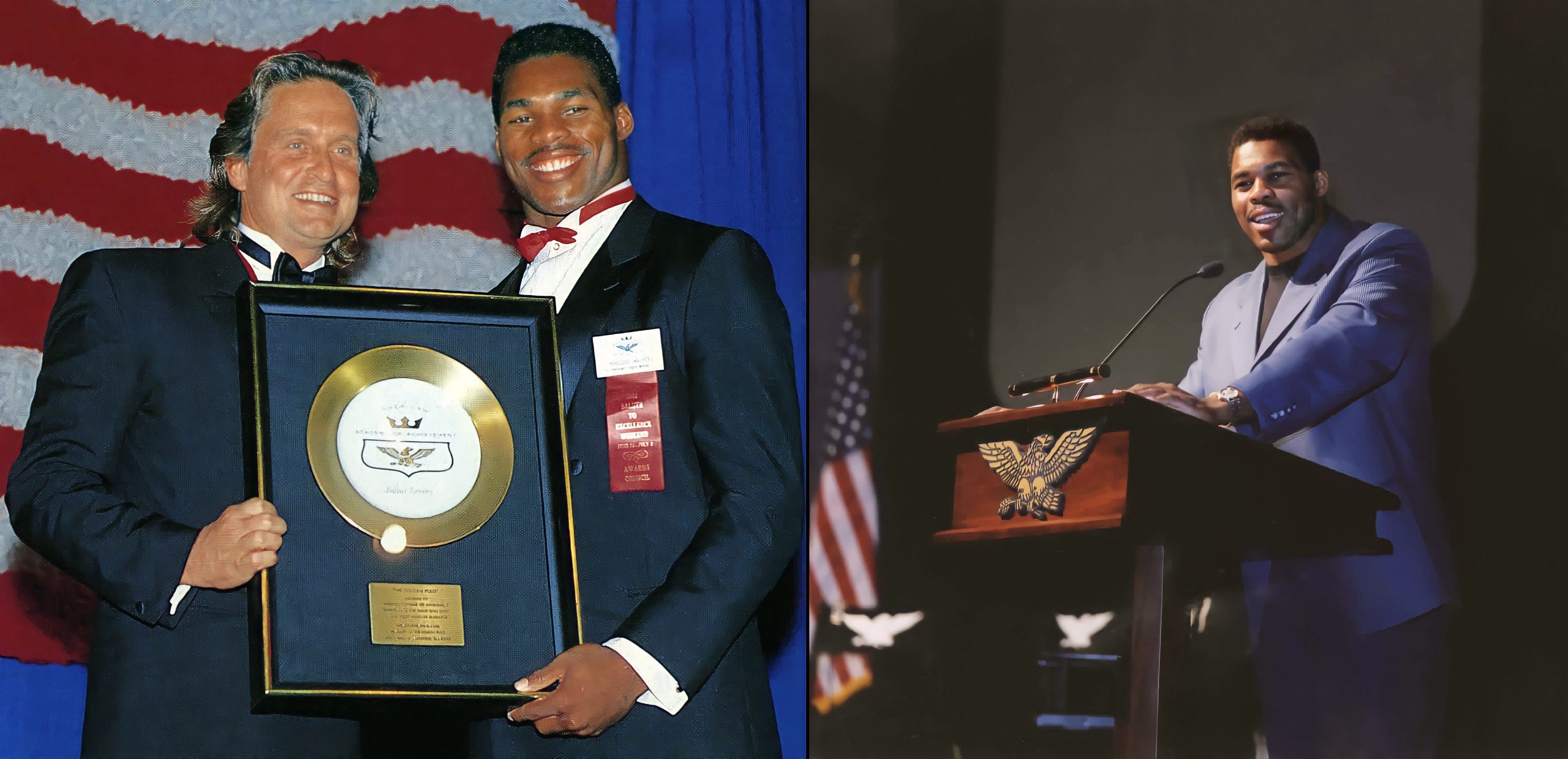
Herschel Walker has worked with numerous charitable and educational organizations. In 1981, he became the first Academy of Achievement honor student to return to the annual program as a recipient of the Golden Plate Award. In 2002, he was voted into the College Football Hall of Fame and was selected as the second greatest player in college football history, just behind the legendary Red Grange.
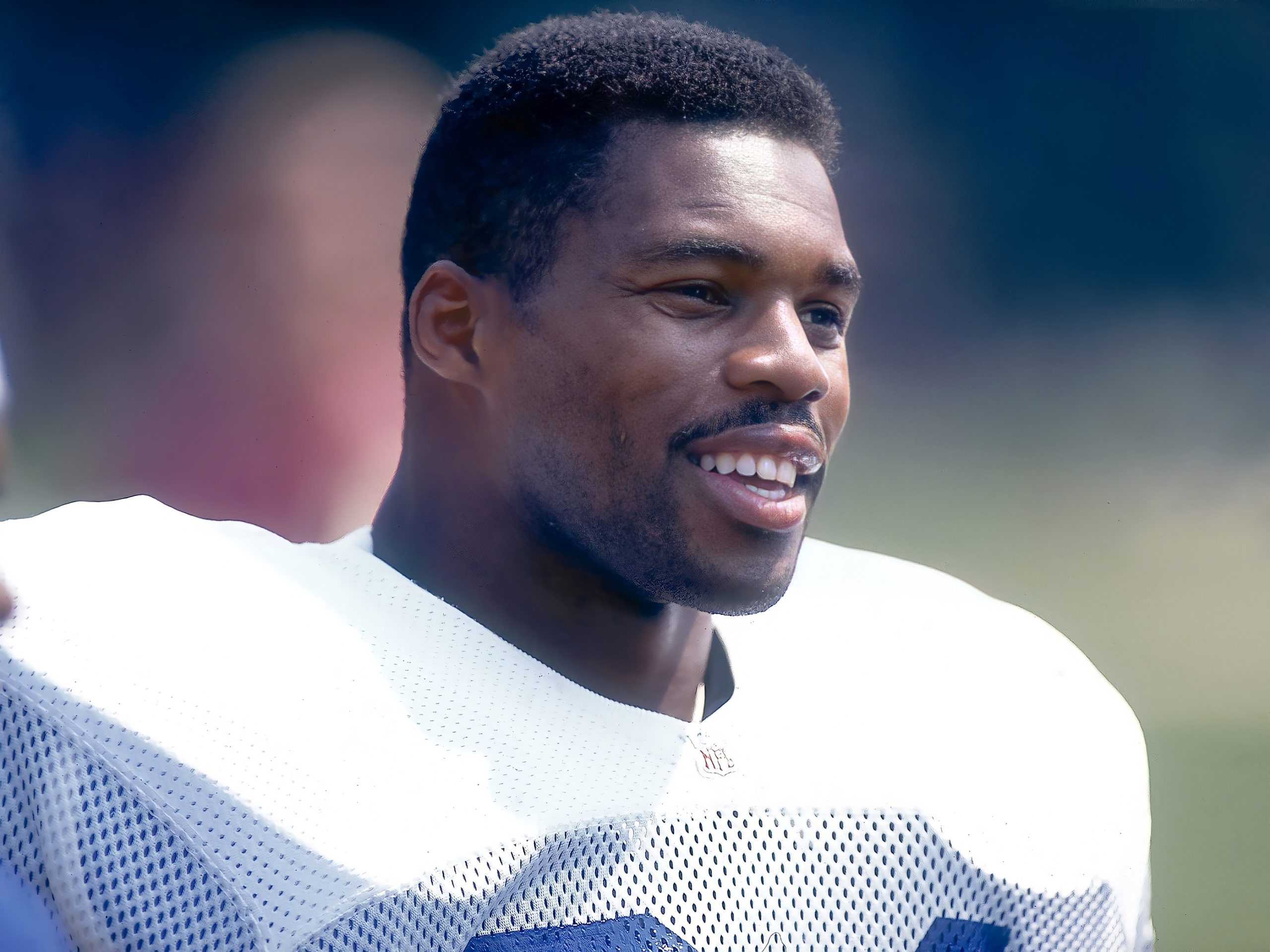
In a 2008 memoir, Breaking Free, Herschel Walker revealed that he had suffered for many years from dissociative identity disorder, a mental illness previously known as multiple personality disorder. Some of Walker’s alternative personalities, which came to the fore after he retired from professional football, expressed a turbulent, angry side of his nature he had previously suppressed. On occasion, he threatened his wife and others with physical violence, but later had no recollection of these events.
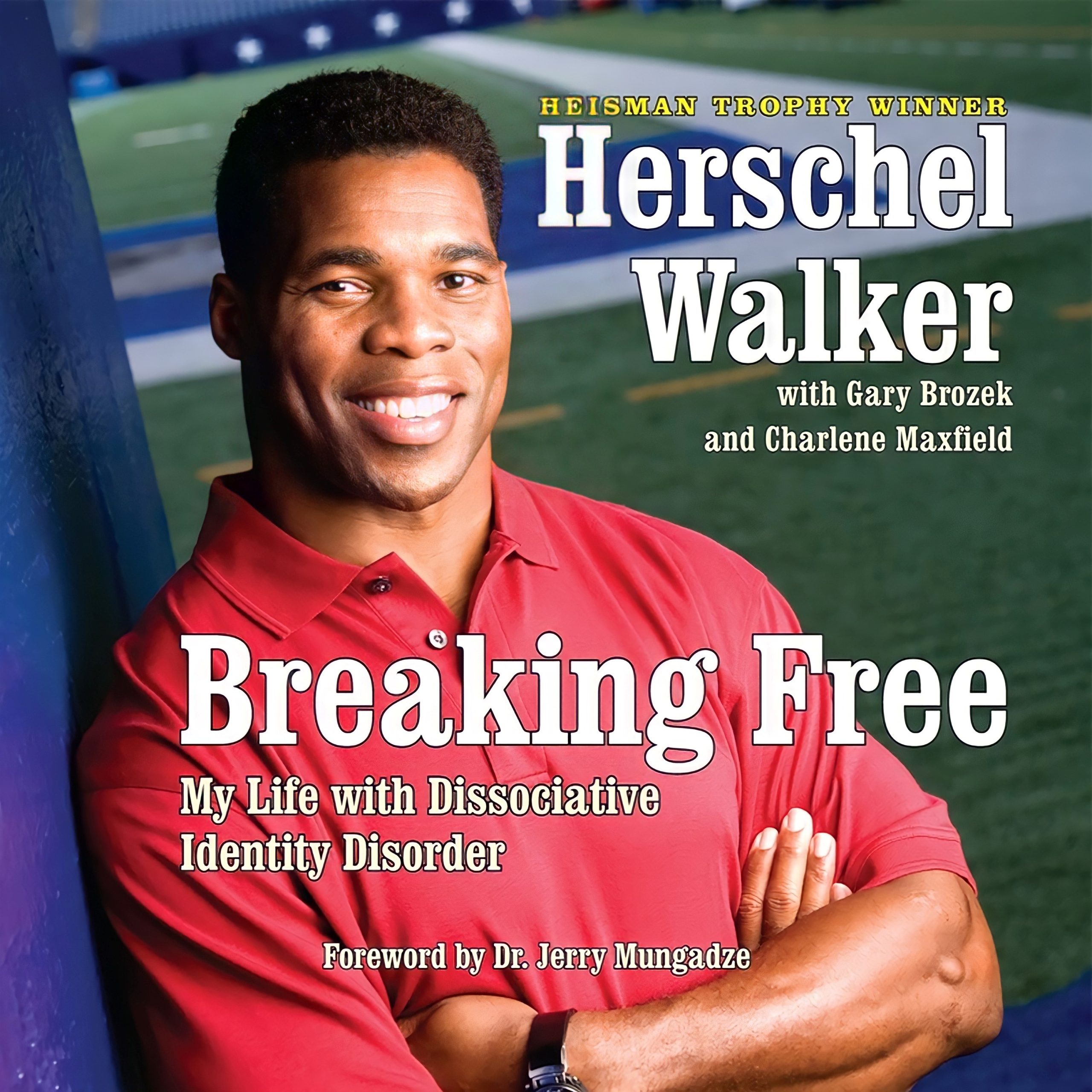
As related in his memoir, he eventually recognized the nature of his problem, which may have been rooted in his childhood experience of bullying and ostracism, and sought professional treatment. With psychotherapy, the disorder can be treated, and Walker decided to make his affliction public, to advance understanding of the disorder and encourage others so afflicted to find the help they need.
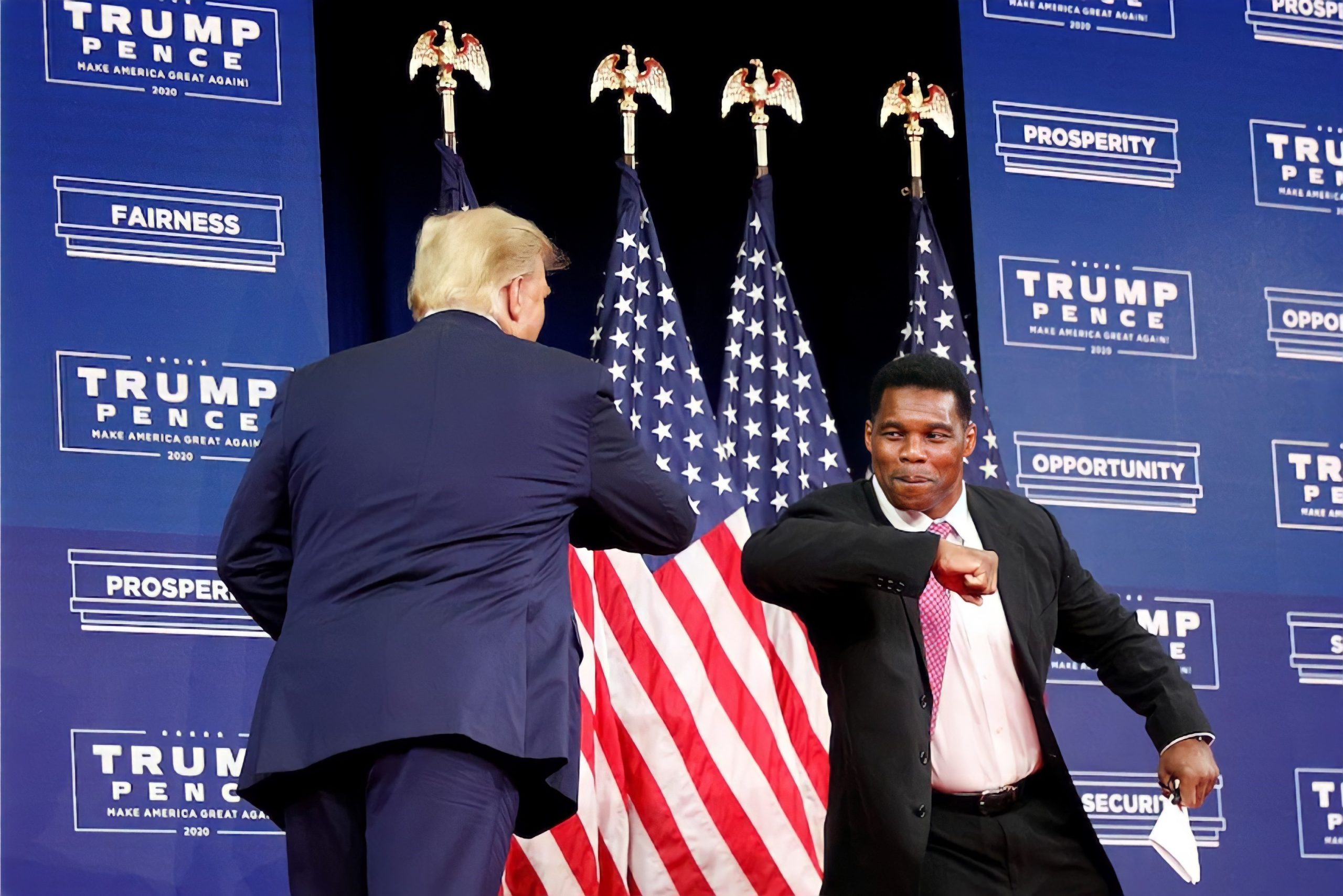
The passage of time has not dimmed the glory of Herschel Walker’s exploits on the football field. When college football celebrated its 150th anniversary in 2019, sports journalists compiled lists of the greatest players in each position in the history of the game, and Herschel Walker was invariably named as a top running back. The broadcast networks CBS Sports and ESPN each named Herschel Walker to its All-Time All-American Team, a definitive assembly of the greatest players in the history of the college game.
In May 2022, Herschel Walker secured the GOP nomination for the U.S. Senate, emerging as the clear frontrunner with the backing of former President Donald Trump and Senate Minority Leader Mitch McConnell (R-Ky.). Despite a hard-fought campaign, Walker was defeated by Democratic incumbent Sen. Raphael Warnock in the November 2022 general election. Their race was the first time two African Americans served as major party nominees for U.S. Senate from Georgia. On December 18, 2024, President-elect Donald Trump appointed Walker as U.S. Ambassador to the Bahamas, marking his formal entry into diplomacy and reflecting his enduring connection to Trump.

“Strive to be the very best you can be. Run the race against yourself and not the guy in the other lane. The reason I say that is, as long as you give it 110 percent, you are going to succeed. But as long as you’re trying to beat the guy over there, you are worried about him, and you’re not worrying about how you’ve got to perform.”
This philosophy made Herschel Walker one of the most phenomenal success stories in sports history. An unathletic child by his own account, Herschel Walker went on to set all-time football records at every level of play, from high school to the pros. Along the way, he maintained a high grade-point average and the inviolable self-respect first instilled in him by his parents.
He earned the coveted Heisman Trophy in his junior year as a college athlete. The College Football Hall of Fame rated him as one of the two greatest players in the history of the college game, second only to the legendary Red Grange. Herschel Walker holds another distinction as the first student honoree of the Academy of Achievement to return as an adult professional recipient of the Academy’s Golden Plate Award.
(The American Academy of Achievement interviewed Herschel Walker on June 28, 1991 in New York City, and on June 17, 1994 in Las Vegas, Nevada. The following transcript includes questions and answers from both Academy video interviews.)
People see Herschel Walker today and they see this strong, confident champion athlete. But we gather that’s not how you always felt growing up. What were you like as a kid?
Herschel Walker: Growing up, I was not that athletic and I had a speech impediment. So to be a person that was non-athletic, having a speech impediment, I had a lot of kids that made fun of me. I had a lot of teachers that didn’t take the time out to help me to overcome my shortcomings. So, I had parents that told me, “You’re not going to use that as an excuse. You’re not going to use that as an excuse not to at least try hard and to get good grades or to do whatever. You’re just going to have to work on your own.” And I’d sit in the mirror, day after day, night after night, saying, “She sells seashells by the seashore,” and all those tongue twisters and this and that. And I overcame the speech impediment and I became valedictorian of my class my senior year. All those teachers that didn’t want to take the time out to help me out, they decided they wanted to take the credit for it. But I had loving parents that, no matter what, they were not going to let me use excuses for anything.
I graduated high school as the Beta Club president, which is a club that you have to have A’s to be a part of it. I was president of the Beta Club. I went into college with a very high grade point average because I knew the work ethics that it took. I knew that as long as you apply yourself — from what my parents have told me — as long as you apply yourself, you are going to succeed.
Too many people today are afraid to step up at bat. They are afraid that life is going to throw them all kind of curve balls and this and that. And you know what is so strange is there is no one in professional baseball that is batting a thousand. I doubt there is anyone batting six hundred. There is no one probably batting even five hundred. But as long as you’re not afraid in life to step up and take on a challenge, you never know what is going to happen. And every challenge that I have been faced, I am going to step up and swing. Because one time I may hit a home run. And that home run is going to carry me a little bit farther. That’s what is so great to me about the Academy here. I’ve won so many awards in my life. I’ve won a lot of things. But I remember when I got the word about coming up here to the Academy as a student — I was getting so many scholarships all at first — and I really didn’t know what to think of it, until I got here and saw the other students here. And it made me proud to be a part of that.
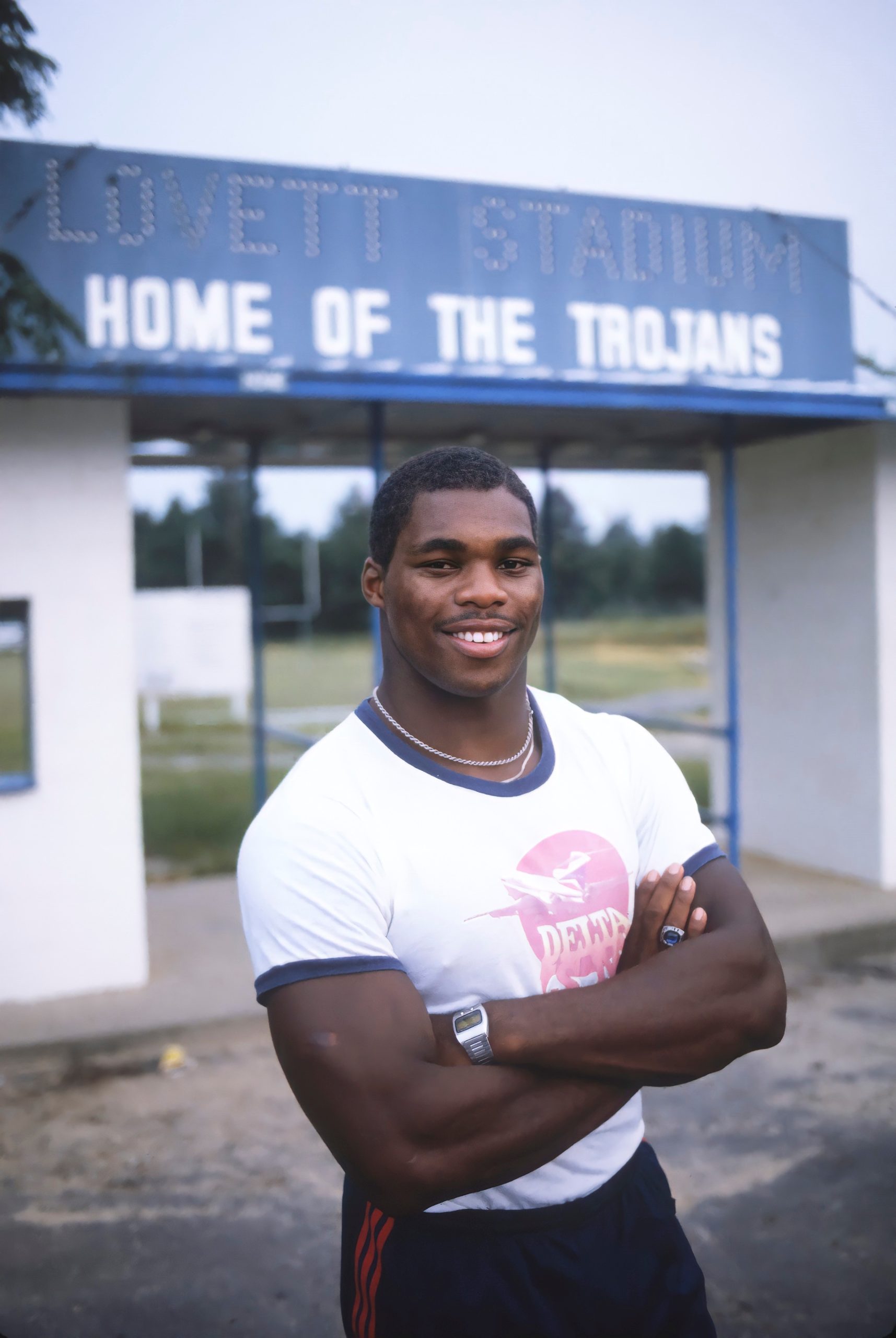
Besides your parents, you’ve mentioned a teacher or coach who helped you.
Herschel Walker: There was a high school coach that believed in me. His name was Tom Jordan. And it was funny, I had two older brothers who were very athletic. Coach Jordan saw me and how clumsy — and I couldn’t run, couldn’t do anything. He just said to himself, “If his two brothers are great at sports, Herschel’s got to have something. He’s got to be good at something.” So he used to come pick me up at the Sunday school at the church, and on Saturdays, and make me go out to this track and he’d work out with me. He’d play with me and he made me feel good about myself. And he said, “Okay. You’re going to do your homework here. You’ve got to do this here.” And he was just like my parents, and he believed in me. He did teach me that, when they say what teacher you had, and I say a coach, most people say, “Oh geez, that’s just sports.” But that’s not. It’s that he was someone that was the role model — was the teacher — in my life.
He always wanted a bass boat and he’s a big fisherman. It’s funny because he always wanted a bass boat, and growing up in Wrightsville, Georgia, I don’t have any money. I could barely rub two nickels together. And then, becoming a professional football player, I got him a bass boat. And I loved that because, for what he did for me, to put me in the position I’m in right now, you know, a bass boat isn’t enough. He means a great deal to me.
You talked about exercising to build yourself up. What kind of exercise did you do?
Herschel Walker: My parents didn’t have a lot of money. My high school didn’t have a lot of money to afford a lot of the expensive weights and, you know, all this stuff. They used that as an excuse. I started doing push-ups and sit-ups during commercials as I was watching TV — and started doing about, sometimes, 2,000 push-ups, 3,000 sit-ups, 1,500 pull-ups, 1,000 dips, and different things like that. I started creating different hand positions for all that, and then I learned that that could work you out. In the olden days, that’s what people used to do. People sit around now, saying, “Let me create this machine that will work this muscle here for someone, and I can make a billion dollars.” He don’t even use the machine, but he wants to create it so that he can make money off of it. But I’m doing it to work myself. I have a lot of people that write to me, saying, “Herschel, why don’t you come train me? I’ll pay you this, I’ll pay you that.” And I say, “No. Your body is different from my body. This may work good for you and not work good for me. It may work good for me and not so good for you. So for me to say I’m a trainer, I’ve first got to know you. I’ve got to know what your body is. I just can’t say, ‘This is going to be great for you.’ But I can say, ‘It will help you a little bit, but there may be another thing that you need to do that’ll be a little bit better.'”
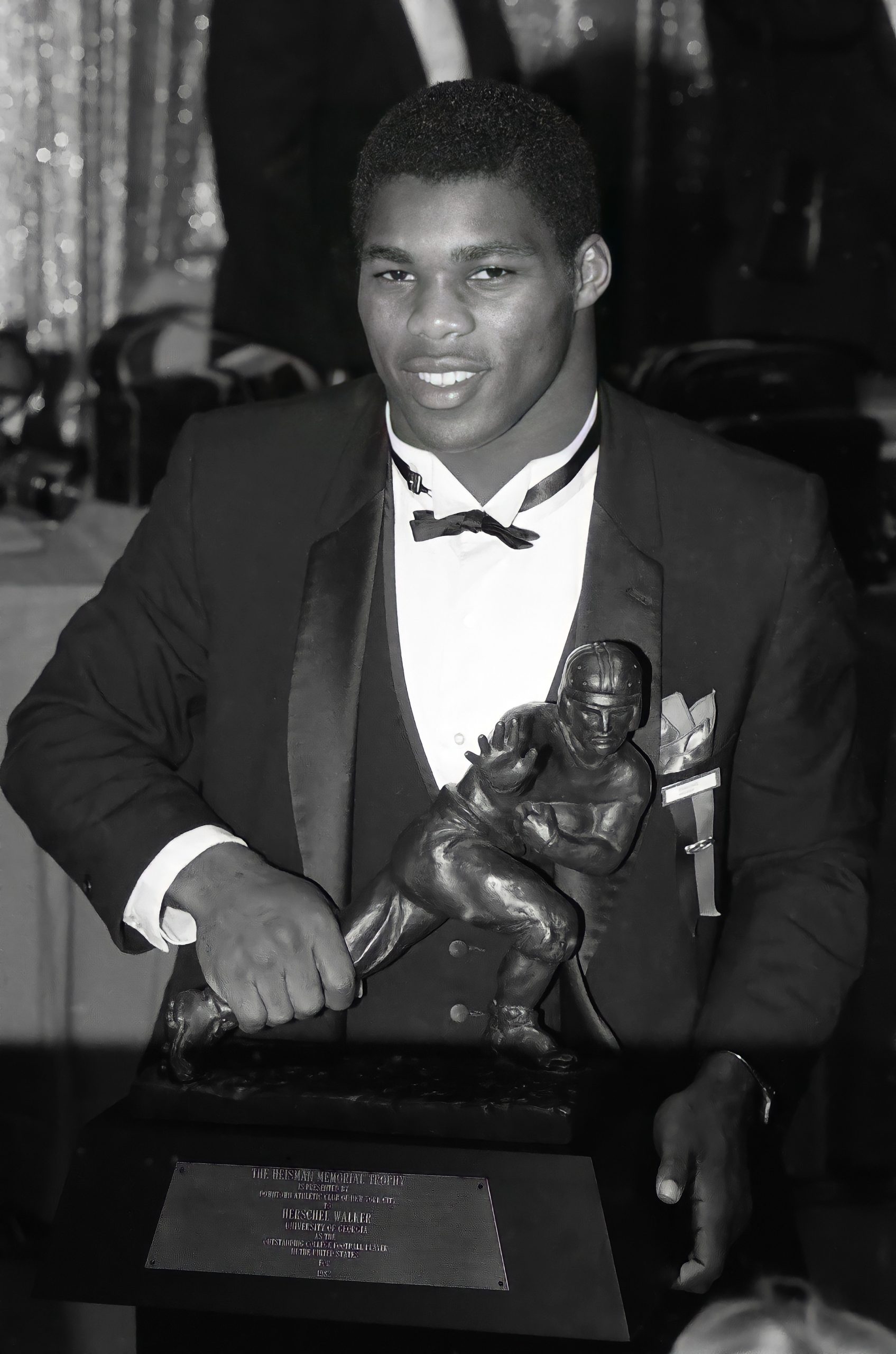
We read that another motivation you had was trying to beat your older sister in a foot race.
Herschel Walker: My sister, she is a little bit over a year older. She was fast, and I was that chubby kid. And she was always beating me; she always beat me. I just felt that I couldn’t see a girl beating me all the time. And I said, “I’ve got to beat her. I’ve got to beat her.” And I just trained and trained, and every time I went up to race her, she beat me. Every time I went up, she beat me. And after you’ve been beat over ten times, sometimes people got a tendency of quitting. And I said, “No, I’m not going to quit. I’m not going to quit.” And I kept doing it until I got where I could beat her. And what was so strange about it is the first race that I ever beat her, I barely beat her. But I think that was the springboard. Once I saw I can do it, I said, “Uh-oh, now it’s a little different. Now I’m ready.” And I think that’s the way the mind works. Sometimes you may not think you can do it. You may not think you can do it, but as long as you’ve got that doubt, you’re never going to do it. I think that’s what happened. By me continuing to want to race — and continuing to want to race her — sometime you’ve got to win.
You can take two little dogs. One can be a small dog, the other one is a small puppy, but it’s going to grow up to be this huge, 160-pound dog. And you can take this one 30-pound little dog that is an adult at the time, and this big dog, as he grows up, he is being dominated by this little dog. So he always grows up thinking this little dog can beat him. So he can get to his full size of 160 pounds, and this little dog still is only 30 pounds, but the big dog still thinks the little dog can beat him, so he is afraid of him because he doesn’t know any better. Sometimes that’s the way the mind is. If you continue to say you can’t do it, you are not going to do it. But sooner or later you got to swing that bat because you never know if you’re going to hit a home run.
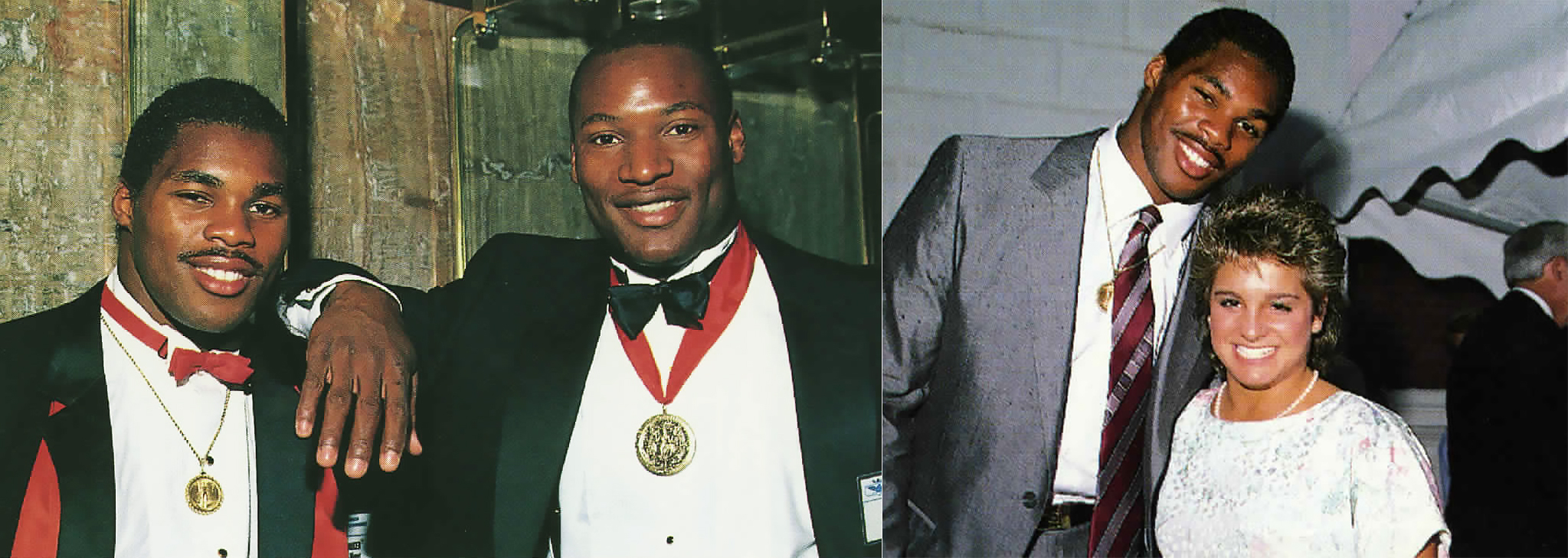
You’ve mentioned a race you ran in middle school that didn’t work out so well but taught you a lesson. Can you tell us about that?
Herschel Walker: When I was in the seventh grade, I think, they have this race at the end of the school year, like a mile run. And I felt that if I can win that mile run, I’d have all these friends. People were going to come and talk to me because I won the mile. So about three weeks before the race — my father was a farmer, so he plowed this field — and I got out and went into training with my younger brother. We went out and we went into training so I could get ready to win this mile. For three weeks, I trained.
The day came for the race and I got up there with this guy, Willie Jenkins. I remember his name and this other guy, Wells, who everybody predicted they were going to win that race. They were the most athletic kids in my class. And I got up there right with them to run this race, and we started running. I was feeling good. I was feeling great. I was in shape. No one knew I’d been training except my younger brother.
So we were running around the track and about the second lap, something said, “Herschel, you’re not going to win.” I’m running and I’m thinking, “Okay, wait a minute.” Third lap, something said, “Herschel, you’re not going to win.” And I’m up front. There’s only like — I’m in second place. I’m right up front. I’m feeling good. I’m not even tired. And going into the last lap, something said, “Herschel, you’re not going to win. You’re not going to win this race. You better get out of it. You better get out of it.” So I started thinking, “Oh, geez, I’m not going to win, so how can I get out of this race without embarrassing myself?” And I’m like in second, whereas I probably could have won it if I had kept running. And I said, “Okay. What am I going to do? I’m going to pretend like I pulled a muscle.” So on the last curve, I walked off the field and grabbed my hamstring and pretended like I hurt my leg. And Willie Jenkins ended up winning this race and all day it bothered me. I remember going home and getting off the school bus. My younger brother ran up to me and said, “How did it go? How did it go?” And I said, “Well, I hurt my leg,” and I lied about it. He said, “Oh, you know, you’ll get them next time.” That made me feel so bad, because I lied, and I think the thing is I didn’t try. I said then, no matter whatever happened in my life from then on — I don’t care what happened — I’m going to give it everything I’ve got. It’s funny because I see so many people today that don’t want to try, and I say I don’t care what I ever do, I never give up at anything anymore. I don’t care what it is, you’ll never see me give up.
People think I’m crazy because I do so many crazy things, but I think because of that race in my life, I’m what you call the renegade of professional sports. You know, I’ve done everything. I’ve done boxing, karate, dance, to just about anything. Now, I’m not going to say I’m the best at it, but I guarantee you, I give most people the run for their money at just about everything.
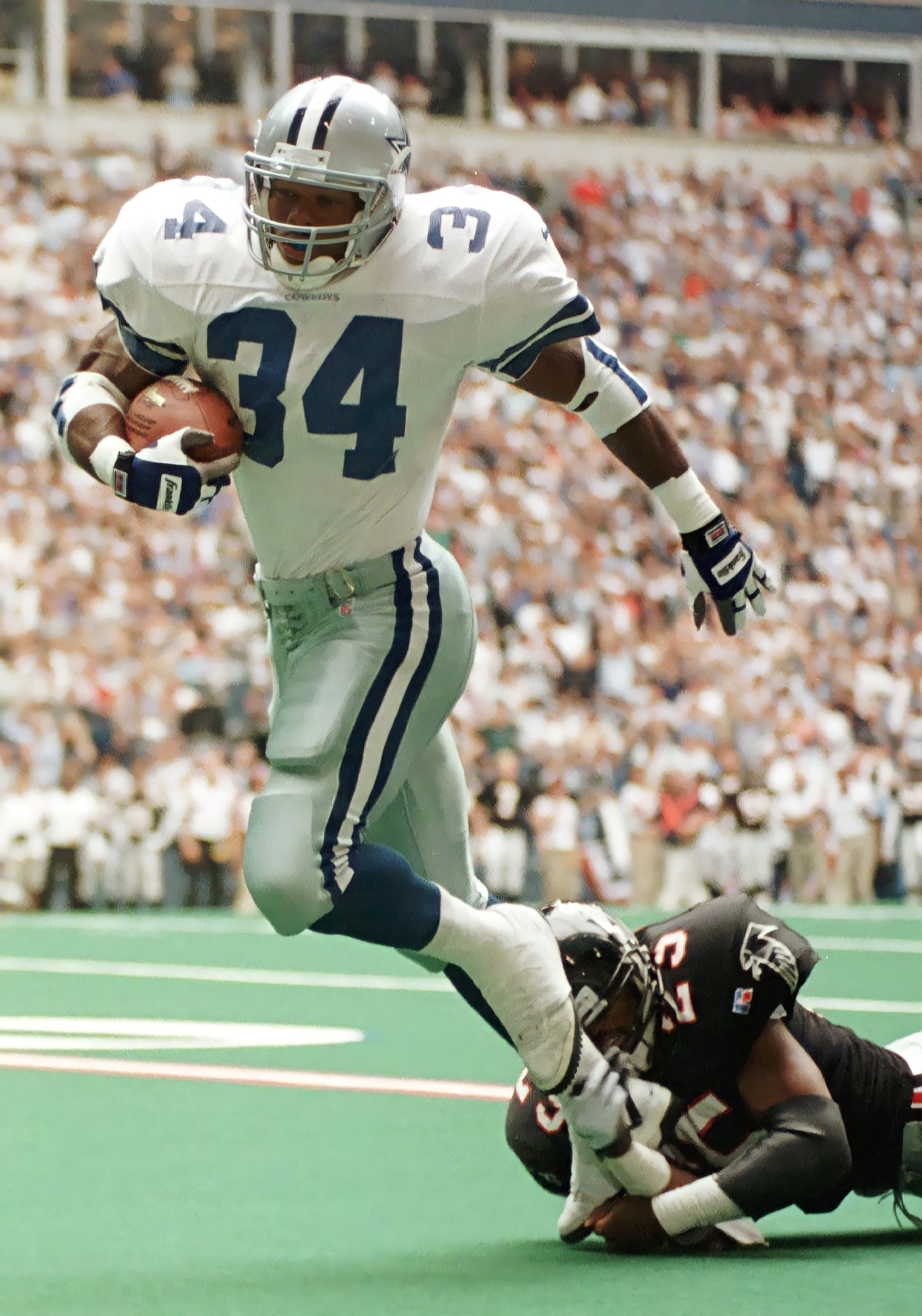
What do you say to a kid who’s in high school and all he can think about is being an athlete? He doesn’t study; that’s all he thinks about.
Herschel Walker: Being an athlete is being a competitor, not on the football field, but in life. And you’ve got to be able to compete in the classroom because you can always be president when you are 60, but when you turn 30, they’re going to say you’re too old for football. So knowledge can take you a long way; being an athlete can only take you a short little sprint. You want to study hard because then you’ve always got something. Like I say, it is so great to be able to understand something. To sit down with the president and understand what’s happening, and then to go sit out there on the street with anyone and still understand. That is beautiful to do that. Just to go out and run a touchdown is only great for that time. The next week, if you don’t do it, they don’t want you around no more.
What’s the biggest challenge you’ve had to overcome?
Herschel Walker: The hardest thing I’ve had to overcome in life? I think racism. That’s so difficult because I don’t think anyone can ever understand it. It’s not the point that people don’t want to understand it, but they don’t want to touch it. Like, “That’s a subject we can’t touch. Let’s get away from it.” But you know it’s there. And as long as it’s there, you’ve got to cope with it. With me, I’m always the type of person, if something is in front of me, let me deal with it. Let’s not push it under the rug or push it to the side because no matter what, it’s going to keep coming up. If you never deal with that dirt up under the carpet, it’s going to get larger and larger, and it’s going to keep coming up. Little bit by little, it’s going to seep from underneath that carpet. So you deal with it now. You’re going to try to get those piles out. I think that’s been the most difficult thing.
I grew up in the South. My senior year was a very big racial — the tension in my hometown was a very big deal. It’s tough, but you’re knowing who you are, and you’re knowing that “No white’s no better than you are, Herschel. You’re no better than they are.” And I think the biggest thing to help me to overcome it is, when it’s all said and done, God is not going to have a list and say, “Oh, geez. You’re white, so you are going in. You’re black, you’re not,” or “You’re black, you’re coming in. You are white, you’re not.” God don’t care. My mother once told me — this is almost similar to it — I was going to church one Sunday, and I didn’t want to go. I was tired of going to church and stuff. And I hid my shoes. I didn’t want to go. It’s funny because I went in to my mother, and she said, “You ready to go to church?” And I said, “No, I can’t go.” She said, “Why?” I said, “I don’t have any shoes.” You know, you only had one pair of Sunday shoes. And I said, “I don’t have any shoes to go.” And she said, “No, you can come on and go,” and I said, “I don’t have any shoes.” She said, “God don’t care how you look.” I thought about it, and you know, that’s true. God don’t care how you look. He don’t care whether you are white, black, pink, as long as you’ve been a good person and you believe in Him. And I said, “That’s the key.” I think we are always putting things in categories. We’ve got to put someone in a category. He’s this, he’s that, he’s this. You know, that doesn’t matter, as long as he can do the job. I think that’s what counts.
What did it take for you, Herschel Walker, to go from being the runt of the family to the winner of the Heisman Trophy?
Herschel Walker: It takes a lot of hard work. I’m talking mentally, physically, it takes a lot of hard work. You’ve just got to dedicate yourself. I think that’s why I never let anyone read my poetry; I never let anyone see it. I don’t think they could ever understand it. When I speak about this, people think I’m absolutely crazy.
I don’t drink. I’ve never tasted alcohol. I don’t smoke. I never did any of that, but I can get so high off my belief and my will, that it’s almost like you’re invincible. You know, I’m so high off God that, I don’t care what you do to me, you can never destroy me.

